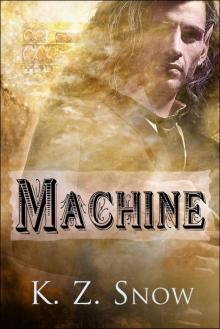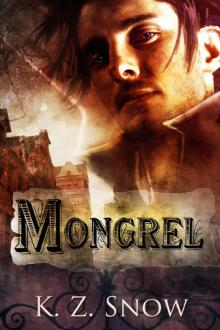- Home
- K. Z. Snow
Mongrel
Mongrel Read online
Chapter One
CLOUDS the color of soiled wool and urine threaded past a gibbous moon. The atmosphere may have produced them but the city had tinted them.
For Fanule Perfidor, the city was too close. Lying just to the west, that packed jumble of flaking bricks, weathered clapboards, and belching chimneys was a gritty distraction. Fanule sensed the pulse of life there. When the mania seized him, as it had tonight, he craved the city’s humid crush of bodies, the revelry that made them sweat and steam.
Wind slithered in from the sea and caught Fanule’s cloak, turning it, he imagined, into a black sail fluttering on a sturdy mast. He was a ghost ship plying moonlit seas and portending doom. He was at the mercy of the wind yet he was one with the wind.
He was a freak of nature and a force of nature. Perfidor, the Dog King. The epithet and the image it conjured made him laugh aloud.
The air’s agitation suited his mood. He strode rather than strolled down the boardwalk, his boot heels thudding with satisfying aggression on the planks. The crowd had thinned, but the remaining visitors made a wide berth around Fanule. Their aversion both amused and annoyed him. He considered sucking the light from the white globes atop the lampposts, just to see the silly humans’ reactions.
No, no, no. Can’t play. Must stay on task. Gods, look at that man’s legs; they could bind a body better than tarred rope! And then… no, must stay on task. But where to start? Where, where, where?
Fanule’s gaze darted along the overdone facades of the buildings he passed, all strung together like a lineup of gaudy, aging whores. Colorful pennants snapped above their roofs. How absurd to have elaborate cornices and quatrefoil windows, little gargoyles and square cupolas on structures so squat, so grayed by the hammering salt of sea spray. But, he supposed, fancy was the stuff of Hunzinger’s Mechanical Circus, the permanent carnival that stretched along and beyond the boardwalk and included whatever attractions were tucked behind those fancy fronts.
Look at the signs; look past the blazing and burnt-out bulbs and read the signs.
With effort, Fanule slowed his steps and studied the painted words above each entry. Poseidon’s Playground. Royal Gardens. He was aware of shadowed, lifeless eyes staring back at him from beneath some of the signs.
Ticket booths. Yes. Some were veiled with drapery on the inside, and placards that hung in front of the drapery read Coming Soon. Fanule approached an exhibit that appeared to be open.
A couple, exclaiming quietly, exited the building. A sigh of steam and hiss of hydraulics followed them through the door. Then, a stuttering metallic snap. The exhibit within had likely just begun or ended its cycle.
The couple glanced at Fanule. Startled, they looked again. He nodded a greeting as they hurried past him; then he turned his attention to the ticket booth.
A life-sized homachinus stared sightlessly through the glass. It could’ve been voice-activated. Alphonse Hunzinger had certainly been thorough in remaining true to his carnival’s theme.
These booth tenders would do Fanule no good. Neither would fabricated fauna and flora. Only intelligent, living beings could answer his questions. If Hunzinger was indeed guilty of committing, or planning to commit, atrocities against Mongrels, Fanule’s only hope of uncovering those misdeeds was by talking to someone familiar with the Circus from the inside.
The music pouring from somewhere, everywhere, waffled as the wind caught it. Laughing, Fanule twirled. The gaslights atop iron posts and the electric lights outlining the buildings delineated his stage. As pedestrians cast him sidelong glances, he thought he heard a human voice, a robust voice, but the music had captured his attention now. He waltzed with an invisible partner—a man somewhat smaller than he, comely, graceful. When their dance was through, they would descend to the beach, shed their clothing, and dive into the dark sea….
Little by little, the coil that had sprung within him began to wind back on itself. Little by little, the energy released by the mania withdrew into his cells. Fanule’s steps slowed.
Swaying slightly, he lapsed into dazed stillness. The cloak began to feel heavy on his shoulders. He was crossing the bridge—that was how he thought of his shifts from wild to mild—and there was always this moment when his mind paused in the middle to reorient itself. Slowly, he blinked. Then his mind crept forward, to the mild side. Being calm was good, it was very good. It led to the clarity that came with tranquility. But falling off the bridge was very bad. Beneath it lay a chasm, an echoing void.
Must visit Lizabetta soon. Must get more powder. Can’t forget. Must write it on the walls.
“Labor no longer beneath the ponderous chains of lethargy! Shuck off your dyspeptic despair!”
Fanule turned his gaze to the man with the stentorian voice, the one who stood behind a framed counter on a low platform. A semicircle of onlookers had gathered in front of it.
Behind his platform, the row of facades bowed away from the boardwalk to form a horseshoe-shaped cove. A wrought iron archway, its white paint pitted with rust and webbed with fine cracks, spanned the open end. Light bulbs on the ironwork formed the words Cave of the Seers.
Fanule didn't have to guess what this group of attractions was about. He knew, although their substance was easily enough inferred. Several years earlier, he'd heard the builders of the exhibits gabbling about them as he'd shopped for tools in the city. In each small “alcove” within the “cave” (for that’s what the individual exhibits were called), life-sized automatons laid out fortune-telling cards, conjured spirits, and waved creaky hands over crystal balls. Through elaborate systems of mirrors, levers, pullwires, and voxboxes, hidden female workers helped the automatons come alive.
Fanule turned his attention back to the man whose little stage was centered beneath the lighted archway. The sight of him made Fanule smile. The man was dressed quite ridiculously in trousers and coat patterned in a large black and yellow plaid. A watch chain made a gleaming arc near the bottom of his green vest. His yellow cravat seemed to throttle his neck. Or perhaps his starched collar created the effect, for its corners pointed up at his chin.
In spite of his flashy suit and commanding voice, the pitchman was young and sweet-faced. Fanule liked the look of him, would’ve nibbled him like a peach if given half a chance.
A gust snatched at the young man’s top hat, but he seemed accustomed to the wind’s stealth. He quickly clamped a hand to the hat’s black tower and kept it in place.
His pitch continued. Brandishing a wand in one hand and a corked bottle in the other, he extolled the miraculous healing properties of Dr. Bolt’s Bloodroot Elixir. A signboard above his platform advertised the product in waves of scarlet lettering outlined in gilt.
Fanule drifted closer and stationed himself at the back of the small audience. He felt grounded now and fully capable of appreciating this tender cutlet with the wind-rouged cheeks and inviting, unstoppable mouth.
WILL MARCHMAN’S patter rarely faltered. He prided himself on keeping his wits about him. In spite of his relative youth and unassuming manner, he’d always managed to shout his message over the shrieks of train and factory whistles, over the tootling of fairground organs and the jeers of drunken ruffians. “Discipline your mind,” his Uncle Penrose had often told him as they’d trundled in their horse-drawn showman’s wagon from town to town. “Then let your mind discipline your voice.”
Now, however, Will faltered.
An unusually tall man draped in a distinctive cloak had just stopped behind the score of people who stared up at Will. Thick, purplish-black hair curled over his collar and fluttered around the edges of his face—a severely handsome face, brutish and enthralling, that was softened by a bemused smile. As if those features weren’t distracting enough, he had peculiar eyes and peculiar ears and an alarming mark at
the base of his throat.
“It should be called ‘nostrum remedium’,” Will went on, “for the banal word medicine does not adequately describe this liquid’s remarkable qualities! A gentleman I shall call Mr. K., beset by gout, neuralgia, and a chronic microbial infestation that resulted in weak blood and general malaise, enjoyed not only renewed vigor but renewed virility after taking Dr. Bolt’s cure! As evidence, he fathered three children in rapid succession… when once he barely had the strength to rise from a chair!” Will leaned over his counter and added, with a suggestive leer and lift of the eyebrows, “He rose, all right—repeatedly, and quite energetically.”
As Will paused to accommodate his listeners’ laughter, he couldn’t keep his gaze from sliding toward the tall man, whose expression hadn’t changed. That mark where his neck joined his chest was actually a telling pair of numbers—40:60. Will had seen such marks before, but only in the city proper. Nobody with a ratio burned or tattooed into his skin had ever appeared within the confines of Hunzinger’s Mechanical Circus.
The man was a Branded Mongrel.
And that explained his eyes. And that explained his ears. And it likely explained his height as well.
Will veered onto the distaff path and directed his persuasions at afflicted women. It was difficult to keep his eyes off the Mongrel, even as he gathered in coins and passed out bottles, assurances, and thanks to his customers.
Arms crossed over his chest, the stigmatized man silently maintained his place as Will’s listeners began to disperse. Only after the last one had walked away did he move. He approached the platform.
“May I speak with you for a moment?” he asked in a deep, sonorous voice.
Will eased a hinged wood cover over his stock of Dr. Bolt’s Bloodroot Elixir and secured it with a padlock. “Yes, I suppose so.” He hesitated. The drumming of his heart belied his composure. He’d never before interacted with one of these creatures.
The Mongrel stepped closer to Will’s platform. “You needn’t come down if I make you uneasy.”
“Well, you’re tall enough so I can speak to you from here.” Will knew he shouldn’t have worried about seeming rude, but the possibility still bothered him. A good salesman cultivated courtesy as much as showmanship and dispensed both to all his customers equally. “What is it you wish to know?”
“Let me introduce myself.” The man handed Will a calling card like any other. It didn’t burst into flames or stain Will’s fingers with some noxious substance. “I’m Fanule Perfidor. And yes, I’m from Taintwell.”
That much was evident. Taintwell was where these creatures lived. It was a settlement attached to the city but, like a scab on a knee, not actually a part of the city.
“Will Marchman.” He didn’t offer his hand.
Neither did Perfidor. Mongrels weren’t allowed to touch the citizens of Purinton. “To begin with,” he said, “I’d like to know where you get that medicine you sell.”
“The laboratory of Dr. Bolt, of course.” Will slipped the card into a vest pocket. “Mr. Hunzinger himself made me aware of the product and even vouched for it. So I place my orders through his office and receive monthly shipments by rail. A Circus worker then brings the crates directly to me.”
Perfidor pursed his lips and nodded. “It seems to do quite astonishing things. Have you tried it yourself?”
Heat rose in Will’s face. “Well, I’m too young to need an elixir.” Truth be told, he could barely tolerate the smell of the stuff. The thought of tasting it made his throat constrict. “But it’s been well received by the public. Enthusiastically received, in fact. I have many testimonials.”
“Given to you personally, or provided by”—Perfidor lifted his gaze to the sign—“Dr. Bolt?”
“Both.” Will felt a little spellbound, as if he’d been listening to the strangely melodic rumbling of a volcano. “Why do you ask?”
Although shaded by dark brows, Perfidor’s eyes were impossibly backlit. Looking into them, one violet and one green and both vividly colored, was like looking into a glowing lilac bush. The wind ruffling his hair revealed ears that seemed oddly truncated at the top, resulting in straight lines rather than curves.
It shouldn’t have been surprising. The Mongrel was forty percent human and sixty percent… something else.
“I should like to try some,” Perfidor said. “That’s why.”
“But I’ve already locked up my stock.”
Perfidor arched one coal-black eyebrow. “Can you not unlock it?”
Now that Will thought about it, he’d neglected to take his end-of-day inventory so he could tally the number of bottles he’d sold against the money he’d taken in. Hunzinger would want to see the figures. He took a keen personal interest in all the concessions at his carnival, even those run by independents.
“Well, yes, I….” Will let his voice trail off as he fumbled in another vest pocket for the strongbox key, then fumbled more in the portable strongbox for the padlock key. Once he’d lifted the display rack’s cover, he pulled out a bottle for Perfidor and did a quick count of the ones remaining. He penciled the number in a small ledger before once again securing his stock.
Perfidor had enough sense to proffer payment before Will handed him the Bloodroot Elixir. Silver gleamed from his long fingers.
Will glanced at the coins. “That’s too much, sir. One will do.”
Perfidor smiled as he dropped a single coin into Will’s left palm and took his purchase from Will’s right hand. He slipped the bottle into an interior pocket of his cloak. “The second can be yours, and a third as well, if you agree to speak with me. In a more private location, of course. I need to ask questions of somebody familiar with the Circus.” He motioned across the boardwalk. “We can go down to the bathing beach.”
The request quickened Will’s breathing. Not because it was posed as a bribe, but because Perfidor’s presence was becoming unsettling. He was both frightening and alluring. Very alluring. His cruel mouth and baritone voice and bewitching eyes, the broad shoulders supporting his cloak and the expanse of chest that stretched his gleaming white shirt, all bespoke a sensuality Will suspected was more drugging than any patent medicine.
Damn it all, but his appetite was growing. He hadn’t had a fully satisfying encounter in weeks.
Will swallowed to moisten his suddenly dry throat. “I don’t think that would be appropriate, sir.” He deposited the coin in his strongbox, which he relocked and set on the shelf beneath his counter. He wouldn’t leave the money or his ledger there, of course. Once the Mongrel had departed, he’d secret both on his person before heading for his living-wagon.
However, Perfidor didn’t seem inclined to depart. “Why is conversing with someone inappropriate?” he asked. “I certainly have no intention of harming you. As I said, I’d be happy to compensate you for your time.” After a beat, he muted his voice and added, “As well as your discretion.”
Will licked his lips. “But you’re… an individual with whom I shouldn’t be consorting. We can conduct trade with your kind, but—”
“My kind,” Perfidor said sourly. “You haven’t peered behind too many closed doors, have you, Mr. Marchman? You haven’t ventured down Skipskin Mews or Weeping Myrtle Close or into any of those forlorn little rooming houses along the Whitesbain Plank Road.”
“No, I haven’t.” What on earth was he implying?
“Are you familiar with the Needles?”
“Yes, of course.” It was Purinton’s textile district, where long, bleak factories drew power from a mill stream.
“If you prefer female companionship,” said Perfidor, “there’s a knot of lanes around the Needles where you can find it. And where ‘my kind’ can also find it. But if you prefer male companionship—”
Will’s nerves tightened. “What are you getting at?”
Perfidor didn’t explain. His smile crimped into a smirk. “In addition to Skipskin, there’s Hansom Row, where the hammer-strikes of carriage builders and blac
ksmiths ring. To men of a certain bent, it’s known as Handsome Row. Nearby public houses welcome the patronage of such men.” A rivulet of perspiration trickled from Perfidor’s temple to the corner of his mouth. The tip of his tongue lanced out and licked it away. “I know. I’ve been to many of these places many times. I’ve socialized with your kind many times. And in ways that might surprise you.”
Will stared. He felt the dampness collecting beneath his starched collar and cravat. Could Perfidor tell that he very much liked handsome men? That at this very moment, vaguely obscene images danced through his brain?
“What I’m getting at, Mr. Marchman, is that you’d best not make assumptions about who can be found in whose company until you’ve seen more of the world. Even this little world, this city you think shuns us. We’re quite welcome after nightfall if we go to the right places.”
“I… have no knowledge of such things.”
“That much is clear. And you likely don’t know there are Mongrels who actually live in the city. Many whose ratio exceeds sixty-forty have avoided the stigma because they easily pass as pure human.” Perfidor inched forward, tilted up his face, and sniffed. “You could be one yourself, Mr. Marchman.”
Although he knew precious little about his ancestry, Will jerkily shook his head.
Perfidor met his weak denial with another enigmatic smile. “It doesn’t matter. So will you go somewhere less public and speak with me?”
“I will not. Forgive me, sir, but I haven’t the level of ease or experience you claim other Purintonians have with Taintwellians.”
Sighing, Perfidor lowered his eyes for a moment, then glanced down the boardwalk in both directions. Very few strollers remained. As the evening wore on, most visitors congregated at the features lying south of the promenade: refreshment and cigar stands, amusement rides, the concert hall and dance pavilion, Wheel of Fortune Avenue.
“All right,” said the Mongrel, looking at Will once more. “We’ll talk here. You do have knowledge of Hunzinger’s operation. Correct?”

 Xylophone
Xylophone The Prayer Waltz
The Prayer Waltz Machine
Machine Bastards and Pretty Boys
Bastards and Pretty Boys InDescent
InDescent Mongrel
Mongrel Ben Raphael's All-Star Virgins
Ben Raphael's All-Star Virgins Fire-and-Water Gate
Fire-and-Water Gate Jude in Chains
Jude in Chains